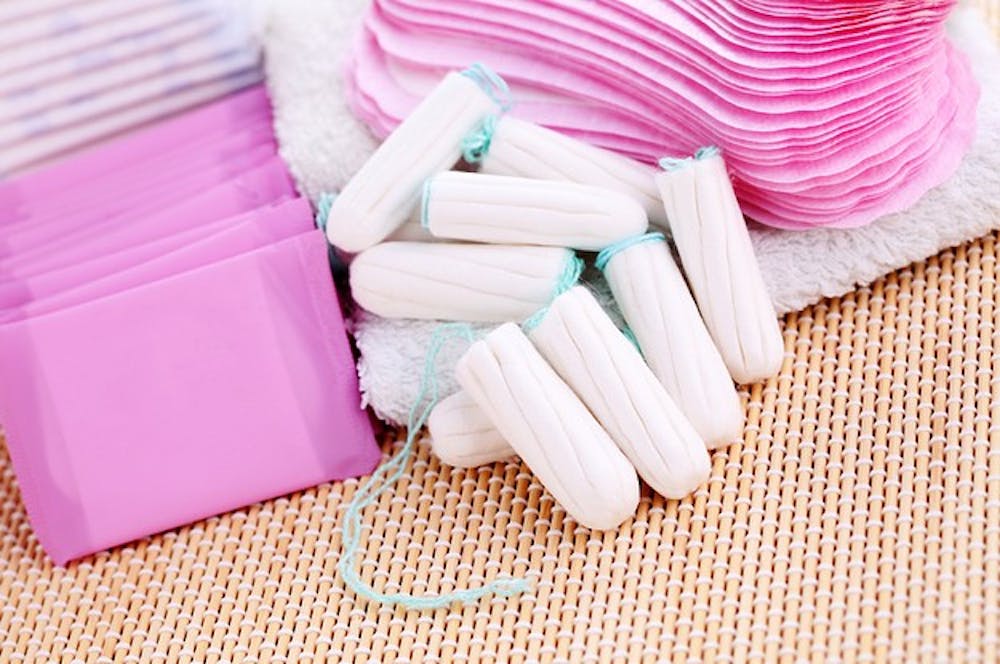Student Association President Gunnar Haberl announced a pilot program to the SA Senate on Friday that will provide free pads and tampons in 20 bathrooms across all UB campuses in May.
SA and the Office of Inclusive Excellence each provided $5,000 for the pilot program, which is a result of a collaboration between SA and a group led by Sharon Nolan-Weiss, director of Equity, Diversity and Inclusion and Title IX coordinator.
Menstrual product supply company Aunt Flow will provide the organic menstrual products as well as sustainable cardboard dispensers.
Haberl was at a conference last fall when he overheard two men talking about something he didn’t expect to hear two men talking about –– their efforts to provide free menstrual products to students on their campus at SUNY Binghamton.
Haberl recalled how former SA President Leslie Veloz highlighted issues with menstrual product access on campus as well as Spectrum articles reporting on the same. He then spoke to SA Vice President Anyssa Evelyn and Treasurer Tanahiry Escamilla about their experiences and opinions about access to menstrual products on campus.
He reached out to the Associate Vice President of Student Life Barbara Ricotta, and the Director of Student Unions Maria Wallace.
“My goal was really to focus on the Student Union because SA is located in the [SU] and all of our clubs are located in [SU],” Haberl said.
His intention was to “start small” and work his way to other parts of the campus.
“What I found throughout my term is that it's easier to have a small ask and then work your way out to a larger ask,” Haberl said. “Because once you can get in, and then branch out, it's more realistic for people.”
But Haberl soon found out that Nolan-Weiss was also working toward the same goal.
“At a faculty senate meeting, a faculty member, Dr. Susan Udin was speaking up and mentioned that years ago, the university had paid dispensers for tampons and pads in the restroom and then took those out and was expressing that [the current situation] wasn't meeting the needs of the community,” Nolan-Weiss said.
She organized a group consisting of Despina Stratigakos, the vice president for Inclusive Excellence, Chris Donacik, the assistant director of Facilities and Lisa McLaughlin, the Delivery+ coordinator for University Libraries.
The group immediately agreed that they did not want to restore the previous coin-operated dispensers, she said.
“On principle, we think that [menstrual products] should be free the same way that toilet paper and paper towels are,” Nolan-Weiss said.
She also cited the cost of putting in metal dispensers, which she said could cost anywhere between $500 to $800 per dispenser.
At the same time, Haberl contacted Donacik about his plans. Nolan-Weiss invited him to collaborate with her group.
“It was great. I mean, our plan as a working group would be to put the pilot together and then get feedback from students,” Nolan-Weiss said. “So that was part of the part of our plan, but we were actually able to do this earlier in the process.”
SA and the Office of Inclusive Excellence’s financial contributions toward the program allowed it to be implemented earlier than Nolan-Weiss expected.
Seven women’s bathrooms in the SU will have the dispensers in May, but Nolan-Weiss hopes to extend the program to the gender-neutral bathrooms on campus to ensure transgender students have access to menstrual products.
She expects the funds to carry the pilot program through one year, and said Student Life would also provide funding if the initial $10,000 ran out before the pilot program’s completion.
Donacik said campus facilities will be in charge of coordinating and mounting the dispensers in bathrooms, as well as restocking the products.
Depending on the success of the pilot program, Nolan-Weiss said she would have a clearer idea of the usage and costs in order to submit a proposal to the university for funding built into their budget.
Tanveen Vohra is a co-senior news editor and can be reached at Tanveen.Vohra@ubspectrum.com and on Twitter @TanveenUBSpec.
Tanveen Vohra is a former senior news editor and covered international relations and graduate student protests.






